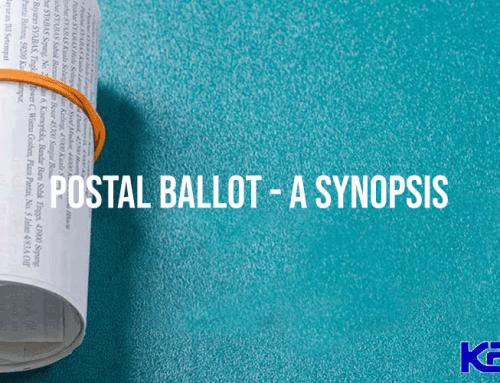Borrowing is a critical source of finance for any Company. Apart from the traditional means of borrowing from Banks, Financial Institutions, issue of secured Bonds and Debentures etc., Sections 73,179, 180 of the Companies Act 2013 read with The Companies (Acceptance of Deposit) Rules, 2014 and The Companies (meeting of board and its powers) Rules, 2014 regulate the manner in which a Company can further borrow money, from whom it can borrow, the extent to which it can borrow and the compliances to be done by it. These are briefly analyzed as below:
- The Private Limited Companies can borrow from the following:
-
- Director of the Company:
A Private Company can borrow from the Directors or from his relatives without any limit. However, at the time of giving loan to the Company, the lender has to provide a declaration to the Company that the amount has not been given out of funds acquired by him by borrowing or accepting loans or deposits from others.
-
- Members of the Company:
A Private Company can borrow money from it’s Members up to 100 % of the aggregate Paid-up Share Capital, free Reserves and Securities Premium Account of the Company after taking the approval of it’s shareholders by passing an Ordinary Resolution in a General Meeting.
Further it can borrow money from it’s shareholders without any limit in case the Company fulfills the following parameters:
(a) The Company is not an associate or a subsidiary Company of any other Company;
(b) The borrowings of the Company from Banks or Financial Institutions or any body corporate is less than twice of its paid up share capital or Rupees 50 Crores, whichever is less; and
(c) The Company has not defaulted in the repayment of it’s borrowings subsisting at the time of accepting deposits.
-
- Employee of the Company:
The Company can accept deposit from the Employees of the Company. However, the maximum amount which can be borrowed from an employee shall not exceed the employees’ annual salary and no interest shall be payable on such loan.
-
- Companies:
The Private Company can borrow money from any other Company without any limit.
Compliances to be done under the Companies Act, 2013:
- Ensure that the ancillary object clause enables the borrowing by the Company;
- The Company has to pass a Board resolution under Section 179(3)(d) of the Companies Act, 2013. The Board of Director have the power to delegate this power to borrow money to any committee of Directors, the Managing Director, the manager or any other principal officer of the company or in the case of a branch office of the company, the principal officer of the branch office;
- It is important to note that the borrowing from members under this category falls under the category of deposit. Therefore, the Company has to file DPT-3 before accepting the loan under this category and shall file DPT-3 annually also. The borrowing from others under this category (other than members) falls under the category of exempted deposit thereby stipulating that the Company has to file DPT-3 annually.
2. The Public Limited Company can borrow from the following:
-
- Director of the Company:
A Public Limited Company can borrow money from it’s Directors without any limit. However, at the time of giving loan to the Company, the lending Director has to give a declaration to the Company that the amount has not been given out of funds acquired by him by borrowing or accepting loans or deposits from others. It is important to note that the Companies Act,2013 does not permit the borrowing from the Director’s relatives under this clause.
-
- Employee of the Company:
The Company can accept deposit from the Employees of the Company. However, The Maximum amount which can be borrowed from an employee shall not exceed the employees’ annual salary and no interest shall be payable on such loan.
-
- Members of the Company:
In order to regulate the borrowing by a Public Limited Company from it’s members, the Companies Act, 2013 defines an eligible company. Eligible Company means a Public Company, having a net worth of not less than 100 crore rupees or a turnover of not less than Rupees 500 crores and which has obtained the prior consent of the Shareholders in a General meeting by means of a special resolution and also filed the said resolution with the Registrar of Companies before making any invitation to the Public for acceptance of deposits. The extent of borrowing by the eligible and non-eligible Companies is as below:
| Type of Company | Borrowing from Members | Borrowing from Public |
|---|---|---|
| Eligible Public Company | Upto 10% of aggregate of the paid up share capital, free reserves and securities premium account. | Upto 25% of aggregate of the paid up share capital, free reserves and securities premium account |
| Non-Eligible Public Company | Upto 35% of aggregate of the paid up share capital, free reserves and securities premium account. | Prohibited |
-
- Companies
The Public Company may borrow money from the any Company without any limit.
Compliances to be done under the Companies Act, 2013:
- Ensure that the ancillary object clause enables the borrowing by the Company;
- The Company has to pass a Board resolution under Section 179(3)(d) of the Companies Act, 2013 for borrowing upto aggregate of its paid up share capital, free reserves and share premium account, apart from temporary loans obtained from bankers’ in ordinary course of business. The Board of Director have the power to delegate this power to borrow money to any committee of Directors, the Managing Director, the manager or any other principal officer of the company or in the case of a branch office of the company, the principal officer of the branch office. In case the borrowing is proposed to exceed the limit mentioned above, the Company has to take the approval of it’s members by way of a special resolution;
- It is important to note that the borrowing from members under this category falls under the category of deposit. Therefore, the Company has to file DPT-3 before accepting the loan under this category and shall file DPT-3 annually also. The borrowing from others under this category (other than members) falls under the category of exempted deposit thereby stipulating that the Company has to file DPT-3 annually.







Leave A Comment